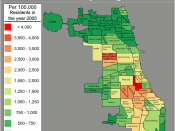Gerbner's Cultivation Theory and Television
Violence is popular in America; it is a cheap and easy way to attract attention, sell newspapers, and boost ratings. Television offers a wealth of realistic portrayals of real-life drama, and with its secure place in living rooms across America, television has become society's storyteller. However, television's depiction of the world differs from reality (Perse, 1994). Crime is a dominant topic of entertainment programming and news broadcasts. Violent crimes are most frequently aired, and although it rarely occurs in comparison to other types, murder is the most commonly covered crime on television (Reber, 2000). Crimes against people (assault, rape, murder) receive much more attention from the media than crimes against property, such as burglary or auto theft (Reber, 2000). Viewing large quantities of explicit violence day after day on news broadcasts and drama shows can "cultivate a social paranoia that counters notions of trustworthy people or safe surroundings" (Griffin, p.
380). Some researchers argue that the prevalence of crime coverage in the media "bestows an unwarranted importance...that deflects attention from noncrime issues, [and] may also unduly enhance the public's fear of crime and the socially harmful consequences of that fear" (Reber, p. 101).
In his cultivation theory, George Gerbner postulates a relationship between heavy television viewing and people's world-views. He suggests that when people exposethemselves to vast amounts of symbolic violence on television, they become conditioned to view the world as a mean and scary place. In other words, the cultivation perspective holds that television's consistently violent messages leads viewers to be more fearful and mistrustful of others (Perse, 1994). The overwhelming presence of violence on television and subsequent research supports cultivation theory.
In his theory, Gerbner defines violence as "the overt expression of physical force (with or without a weapon, against self or others)...


